- Home
- Janet Dailey
Heiress Page 2
Heiress Read online
Page 2
Suddenly the casket was before her, draped in a blanket of sun-yellow roses. Rachel stopped beside it and hesitantly laid the wilted red rose on top of it. The bloom looked so forlorn and out of place she wanted to cry. She blinked at the tears that stung her eyes and trailed her fingers over the edge of the casket in a last good-bye as she turned away. When she looked up, she saw Abbie standing a scant fifteen feet away, staring at her with a confused and wary frown. For a split second, Rachel was tempted to hurry away, as if she were guilty of something. She wasn't. So why should she run? Gathering her fragile pride, Rachel lifted her chin a little higher and started forward at the same instant that Abbie did.
They met midway. Abbie spoke first. "Who are you?' Should I know you?" Her voice was lightly laced with a soft Texas drawl, like Dean's. Rachel noticed that she was taller than Abbie by a good four inches, but it didn't make her feel superior in any way, only awkward and gauche.
"I'm Rachel. Rachel Farr from Los Angeles."
"From Los Angeles?" Abbie's frown deepened, "Daddy had just returned from there.
"I know." Realizing that Abbie had absolutely no idea who she was, Rachel suddenly felt very bitter and hurt. "Dean used to say we looked a lot alike. I suppose we do, in a way."
"Who are you?" she demanded again.
"I'm his daughter."
Abbie recoiled in shock and anger. "That's impossible. I'm his daughter, his only child."
"No, you're—"
But Abbie didn't want to hear any more of her preposterous lie. "I don't know who you are or what you're doing here," she declared, struggling to keep her voice down, "but if you don't leave now—this very minute—I'll have you thrown out of this cemetery."
Chapter 2
Barely able to see through her tears, Rachel bolted from the grave, making her long legs carry her quickly away. She wished she had never come to the funeral. It had been a mistake—an awful mistake.
How had she expected Abbie to react when she met her? Had she thought Abbie would throw her arms around her and greet her like the long-lost sister she was? Half-sister, at any rate. Had she hoped that Abbie would invite her home? No, that would have been awful.
She could imagine nothing worse than seeing all the trophies Abbie had won competing in horse shows on Dean's horses. Rachel had long ago begun haunting the Los Angeles Public Library, going through its magazines and out-of-town newspapers to satisfy her hunger to find out more about the father she saw so seldom. What did he do when he wasn't with her? Where did he live? How did he live? Over the years River Bend had been featured in several magazines, mainly those dealing with Arabian horses, but a few society-type publications as well. Dean had rarely mentioned any of them to her, but in them she'd seen too many photographs showing Abbie astride some gorgeous Arabian with Dean standing proudly at its head.
She'd seen pictures of the family's Victorian mansion, and of the expensive fashions worn by his wife and other daughter when they attended their lavish parties and balls. She'd read all about Abbie's formal coming-out in the society columns of the Houston newspapers: she didn't want to look at pictures of her, stunning in an elaborate white gown, dancing with Dean at a debutante ball. Abbie, so beautiful and daring—and looking so much like her it hurt.
She couldn't bear the thought of hearing about Abbie's travels with Dean to England, Europe, and the Middle East; she had never gone anywhere with Dean except to Disneyland and Catalina Island.
All her life she'd been filled with envy, knowing that Abbie had Dean with her all the time. He was there to tuck her into bed at night. He was there for every holiday, every Christmas morning when she got up. He was there for every important occasion, from piano recitals to graduation. But Rachel had been lucky, especially since her mother died, to see him four times a year.
It was obvious whom he had wanted to be with, whom he had loved. She doubted that she had ever been more than an embarrassing burden to him, an unwanted complication. She thought she'd put all that pain and bitterness behind her. After graduation from UCLA, she had tried to make a life for herself without him. She had a good job and a promising career as a commercial artist with a large advertising firm in L.A. But today, all the old wounds had been opened again. And the hurt went deep—deeper than ever before.
She paused, trying to get her bearings and locate her rental car. Just as she spotted the tan Firebird, a long black limousine pulled onto the shoulder of the cemetery lane and parked in the space behind her car. A uniformed driver hopped out and opened the rear passenger door. Absentmindedly Rachel stared at the silver-haired man who stepped out.
The man said something to the chauffeur, then walked away from the limousine, striding briskly toward Rachel and the gravesite behind her. Something about his strong facial features reminded Rachel of Dean. He was in his middle fifties—about the same age as Dean. She wondered whether his eyes would crinkle at the covers when he smiled the way Dean's had.
A moment later she saw that they did as he noticed her and smiled quickly. "How are you? The warmth, the sincerity in his voice gave meaning to the question, changing it from an offhand phrase of greeting. Rachel was startled to find herself shaking hands with him in the very next second.
"Fine, thank you. Hurriedly she wiped away a tear that had slipped onto her cheek, certain she probably looked awful, her eyes all bloodshot and puffy. But the kindness in his look told her he was too much of a gentleman to notice.
"The services are over, aren't they?" he asked instead. "I'm sorry I was late, but I. . ." He paused, a frown flickering across his expression. "Excuse me, but you aren't Abbie, are you?"
"No. I'm not." She wanted to die when she noticed the way he unconsciously drew back from her. All her life she'd fought against this sense of shame. She'd done nothing wrong, yet she had never been able to escape this feeling of guilt. Trembling with agony of a different kind, Rachel turned to leave.
"Wait. You must be. . . Caroline's daughter."
She paused, tears of gratitude welling in her eyes. At last she'd been recognized by someone, someone who could truly understand the deep loss she felt. "You. . . knew my mother?" Hesitantly she faced him.
"Yes." A smile of understanding crinkled the corners of his eyes. "Your name is Rachel, isn't it?"
"Yes." She smiled for the first time in days. "I'm sorry," she said, shaking her head a little vaguely, too choked with emotion to say much more. "Your name?"
"Forgive me. I took it for granted that you would know me. My name is Lane Canfield."
"Mr. Canfield. Yes, Dean spoke of you often. He. . . thought a great deal of you."
There were some who claimed Lane Canfield owned half of Texas—and the other half wasn't worth buying. According to newspaper accounts Rachel had read, his holdings were vast and widely diversified, ranging from real estate developments to luxury hotels and giant petrochemical plants. Photographs had rarely accompanied the articles. Rachel seemed to remember hearing that Lane Canfield shunned personal publicity.
"To be truthful, the feeling was mutual. Dean was a remarkable man, and a loyal friend. He will be missed by many people."
"Yes." She bowed her head with the grief his words elicited.
"Do you still live in Los Angeles?" Gently he directed their conversation to a less emotional subject.
"Yes. He'd just been out to visit me. His flight back was delayed. He was late. He was hurrying to get home when. . . the accident happened." Hurrying back home, to Abbie, the daughter he loved.
"Will you be staying in Houston long? Maybe we could have, lunch, or dinner, together. I think Dean would like that, don't you?"
"You don't have to do that." She didn't want to be a duty, an obligation to anyone.
"I don't have to do anything. I want to do it. What hotel are you at?"
"The Holiday Inn, the one near the Astro," Rachel heard herself answer.
"I'll call you tomorrow after I've had a chance to check my schedule."
"All right."
> After their good-byes were said, Lane lingered to watch the young woman as she walked away. The resemblance between father and daughter was strong. She was tall and slender like her father, with his thick brown hair and incredibly blue eyes. Sensitive and vulnerable—yes, she was very much like Dean.
Abbie didn't waste any time locating her mother, convincing her that it was time to leave, and hurrying her off to the waiting limousine. She didn't want to take the chance that her mother might run into this woman who claimed. . . It didn't matter what she claimed. The very idea was ludicrous, absurd. The woman was obviously crazy.
The snarl of departing cars on the narrow cemetery lane slowed all movement to a crawl. Her nerves tense and brittle, Abbie leaned back in her seat, wondering how many of their friends that woman had talked to, told her lies to. Texans dearly loved a scandal.
Covertly she glanced at her mother. "Babs—that's short for babbling brook"; supposedly that was the way R. D. Lawson had frequently referred to her, partly in jest and partly seriously. Abbie had to admit that it was a singularly apt description of her mother. Her mother was bubbly and bright, flitting from this thing to that. She could chatter for hours and not say anything. Her life seemed to be nothing more than one long stream of parties. She loved giving them as much as going to them.
Abbie felt that two people could not have seemed less suited for each other than her parents. Yet Babs had absolutely adored Dean. She didn't make a single decision, no matter how trivial, without consulting him. She believed in him totally. Any and everything he did, she thought was perfect.
Not quite everything, Abbie thought, frowning slightly as she recalled arguments that had taken place behind closed, doors: her mother's shrill voice and the sound of crying, her father's angry and determined, yet pained, look when he stalked out. Her mother always remained in the room, sometimes for hours, emerging pale and drawn, unusually silent, her eyes puffy and red. Some of the early memories were dim, yet Abbie had the impression that their arguments were always over the same thing—and that thing was somehow connected to the frequent business trips her father made to California to see one of his clients.
Once, shortly after she had gone off to college at the University of Texas, Abbie had suggested to her mother that she accompany him to Los Angeles. "After all," she had reasoned over, the telephone, "now that I'm not at home anymore, why should you stay in that big house all by yourself? This is the perfect opportunity for you to start going places and doing things with Daddy."
She could still remember the strangled yet adamant no that had come over the line.
"Momma—"
"I hate California," had come the retort, with uncharacteristic bitterness.
"Momma, you have never even been there."
"And I don't care to ever go, either." Abruptly Babs had changed the subject.
With anyone else, Abbie would have demanded to know why. She could become incredibly stubborn when confronted with a wall of any kind. If necessary, she'd take it apart brick by brick just to find out what was on the other side. But it had been obvious this was something Babs didn't want to face. Now Abbie wondered why.
That Rachel woman had said she was from Los Angeles, Abbie recalled unwillingly. Of course, that was just a coincidence—like the distinctive blue of her eyes. Lawson blue. Made uneasy by the thought, Abbie frowned, haunted by the memory of the way her father used to stare at her when he thought she wasn't watching, his expression vaguely wistful and pained, a look of sadness and regret in his eyes, eyes the same shade of deep blue as her own—and that Rachel Farr woman's.
She had always thought he looked at her like that because he wished she had been a boy. What man didn't want a son to carry on the family name and tradition? None, she was sure. He had tried to love her. And she had tried desperately to gain his love without ever fully succeeding.
Maybe that was her fault. Maybe if she hadn't argued with him so much. . . Half the time she had picked a fight with him just to make him look at her instead of through her. They had fought over everything from horses and homework to pot and politics. Their last major confrontation had been over her divorce.
"Abbie, I think you're being too hasty, as usual," he'd said when she told him she had left Christopher. "Every married couple has problems. If you would try to be a little more understanding—"
"Understanding!" she had exploded. "Tell me just how understanding a wife is supposed to be when she discovers that her husband is having affairs—even with women she knows!"
"Now that doesn't mean—"
"What do you expect me to do? Condone it? Are you suggesting that I should look the other way while he makes a fool of me in front of all our friends? I won't be humiliated like that—not again."
"I can understand how you would be hurt by his. . . indiscretions." He had chosen his words with care and slowly paced in front of his desk as if presenting his case to a panel of jurors. "I doubt that he meant for it to happen. Things like that can begin so innocently. Before he knows it, a man can find himself more deeply involved than he ever intended to be. It wasn't planned. It just happened."
"Is that the voice of experience talking, Daddy?" she had caustically shot back at him, only to notice the way he blanched and turned quickly to avoid her gaze. He had looked guilty. Never one to miss an opening that could give her the advantage, Abbie had charged in. "Have you been unfaithful to Momma? Is that why you are siding with Christopher against me, your own daughter? Don't you care that I'm unhappy?"
"Of course, I do," he had insisted forcefully.
"Do you? Sometimes I wonder." She had turned away from him, struggling to control the bitterness she felt. "Daddy, I know you think I should forgive and forget what has happened. But I can't—and won't. I can't trust him. Without trust, there's no love. Maybe there never was any. I don't know anymore, and frankly, I don't care. I just want out of this marriage and Christopher out of my life."
"Dammit, Abbie, no Lawson has ever gotten a divorce."
"In that case, I'll just have to be the first, won't I? It's time somebody set a precedent." On her way out of his study, she had paused at the door. "But don't worry, Daddy. I won't ask you to represent me. I'll get some other lawyer—one without your high scruples."
The subject was rarely broached again after that. Yet Abbie knew he had never truly reconciled himself to the divorce. She had returned home, conscious of the new tension between them and determined to outlast it. Only she hadn't. He had died first. She felt a choking tightness in her throat and tears struggling to surface.
Beyond the tinted glass of the limousine's rear windows, Abbie saw Rachel Farr standing among the gravestones. Had her father had an affair with another woman in the past? Was Rachel Farr the result of it? Was the possibility really as preposterous as she'd first thought?
Too many half-forgotten memories were making it seem more than just a string of coincidences. Snatches of arguments she'd overheard between her parents, the constant trips to Los Angeles, four and five times a year, the way he used to look at her as if seeing someone else—things she had never regarded as pieces to a puzzle were all fitting together now. Devoted husband and father. Had it all been an act? All these years, had he kept another child hidden away in Los Angeles?
Struggling against a sense of betrayal, Abbie stared at Rachel, again considering the startling similarities: the hair color, the shape of the face, and the blue eyes. The prepotency of the sire—that's what Ben would have called it, in horsemen's terms. The ability of a stallion to stamp his offspring with his looks.
It felt as if her whole world had suddenly been turned upside down and shaken hard. Everything she had ever believed to be true, she now questioned. All these years, Abbie thought she knew her father. Now he almost seemed like a stranger. Had he ever really loved her mother—or her? She hated the questions, the doubts. . . and the memories now tainted with overtones of deception.
"Abbie, look!" her mother exclaimed. Abbie instantly stiffene
d, certain her mother had noticed Rachel Farr. "Isn't that Lane Canfield?"
So consumed with Rachel, Abbie hadn't paid any attention to the man she was talking to. It was Lane Canfield, her father's closest friend. She hadn't seen him since her wedding six years ago, but he had changed very little. He was still trim, still a figure of authority, and still managed to look cool and calm in the afternoon heat despite the suit and tie he wore. If anything, his hair—always prematurely gray—now had more white in it, giving it the look of tarnished silver.
But what was he doing talking to Rachel Farr? Did he know her? He acted as if he did. If all this was true, wasn't it logical that her father would have confided in Lane? That logic became even more damning when Abbie remembered that her father had named Lane Canfield the executor of his will.
"It is Lane." Her mother pushed at the switch on the armrest, trying to open the limousine's automatic windows. Finally the window whirred down, and the humid heat of the June afternoon came rolling into the car. "Lane. Lane Canfield!"
Hearing his, name, Lane turned then walked over to greet them. "Babs. I'm so sorry I wasn't able to get here sooner. I was at a meeting in Saudi Arabia. I didn't receive the news of. . . the accident. . . until late yesterday. I came as quickly as I could," he said, warmly clasping her hand.
"It's enough that you're here. Dean valued your friendship so much, but I'm sure you know that." Babs clung to his hand. "You will ride back to the house with us, won't you?"
"Of course. Just give me a minute."
As he walked away, Abbie wondered if he was going after Rachel. But no, he walked to a black limousine parked several cars ahead and spoke to the driver, then started back. She felt numb, not wanting to believe any of this.

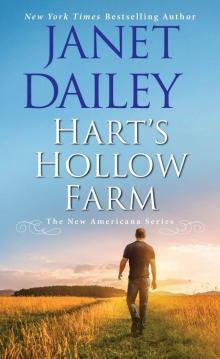 Hart's Hollow Farm
Hart's Hollow Farm Holding Out for Christmas
Holding Out for Christmas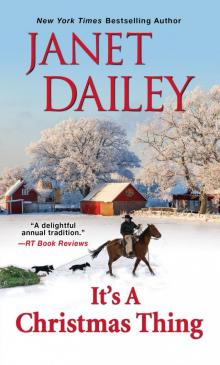 It's a Christmas Thing
It's a Christmas Thing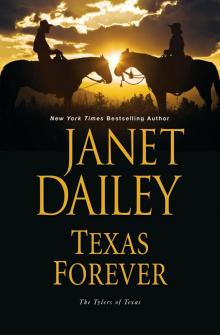 Texas Forever
Texas Forever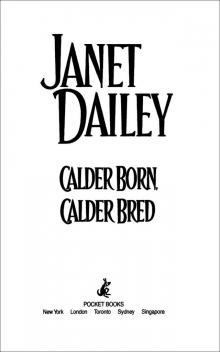 Calder Born, Calder Bred
Calder Born, Calder Bred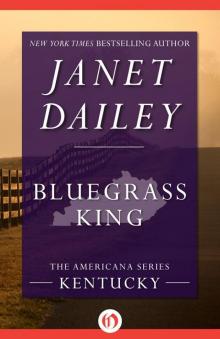 Bluegrass King (The Americana Series Book 17)
Bluegrass King (The Americana Series Book 17)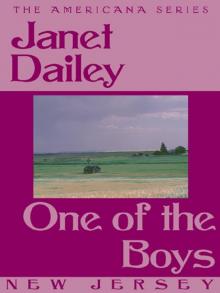 One of the Boys
One of the Boys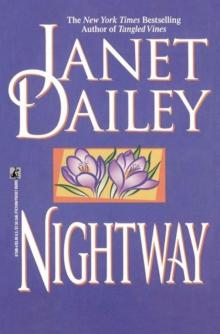 Nightway
Nightway This Calder Sky
This Calder Sky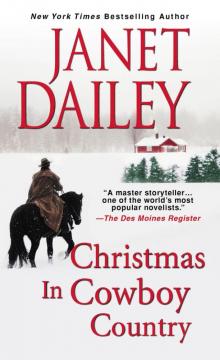 Christmas in Cowboy Country
Christmas in Cowboy Country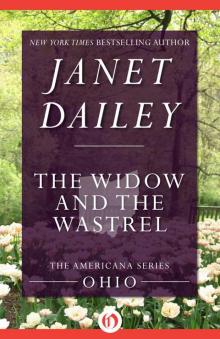 The Widow and the Wastrel
The Widow and the Wastrel Separate Cabins
Separate Cabins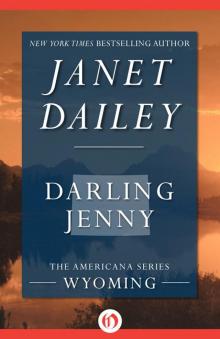 Darling Jenny
Darling Jenny With a Little Luck
With a Little Luck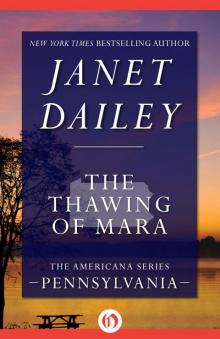 The Thawing of Mara
The Thawing of Mara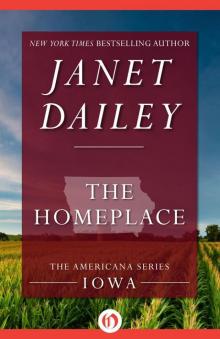 The Homeplace (The Americana Series Book 15)
The Homeplace (The Americana Series Book 15)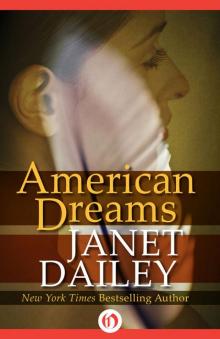 American Dreams
American Dreams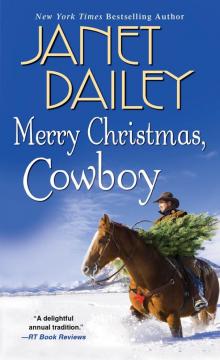 Merry Christmas, Cowboy
Merry Christmas, Cowboy Lord of the High Lonesome
Lord of the High Lonesome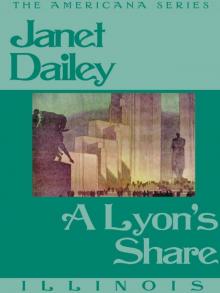 A Lyon's Share
A Lyon's Share After the Storm
After the Storm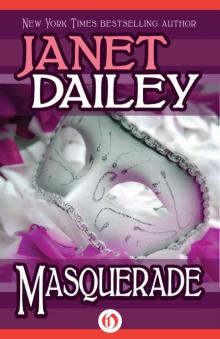 Masquerade
Masquerade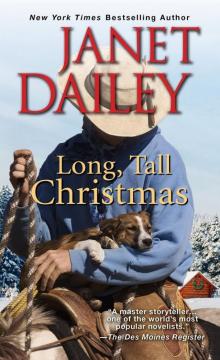 Long, Tall Christmas
Long, Tall Christmas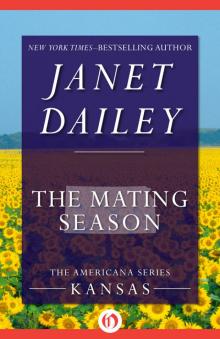 The Mating Season
The Mating Season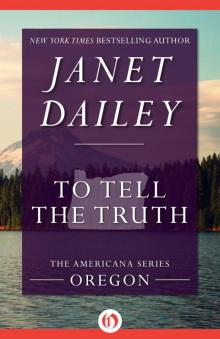 To Tell the Truth
To Tell the Truth A Land Called Deseret
A Land Called Deseret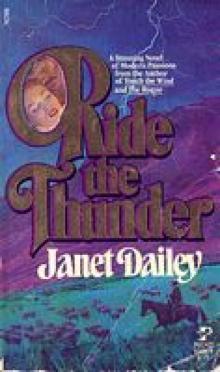 Ride the Thunder
Ride the Thunder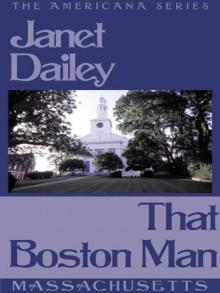 That Boston Man
That Boston Man Wild and Wonderful
Wild and Wonderful Sonora Sundown: Arizona (The Americana Series Book 3)
Sonora Sundown: Arizona (The Americana Series Book 3)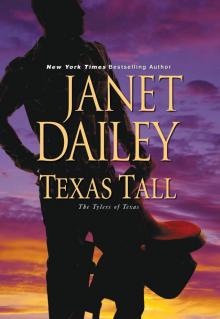 Texas Tall
Texas Tall Giant of Mesabi
Giant of Mesabi The Bride of the Delta Queen
The Bride of the Delta Queen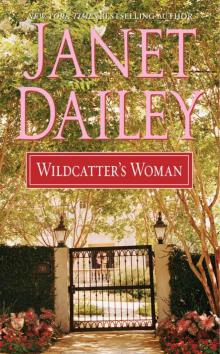 Wildcatter's Woman
Wildcatter's Woman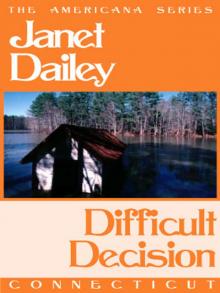 Difficult Decision
Difficult Decision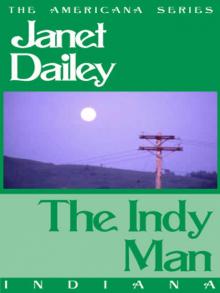 The Indy Man
The Indy Man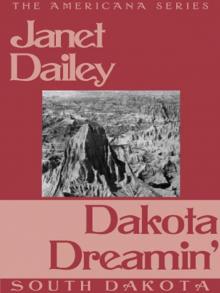 Dakota Dreamin'
Dakota Dreamin' Kona Winds
Kona Winds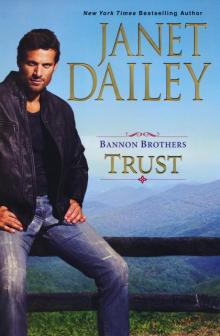 Bannon Brothers
Bannon Brothers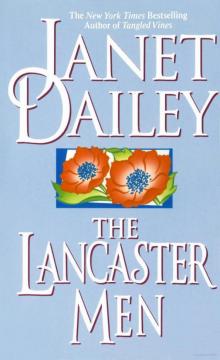 The Lancaster Men
The Lancaster Men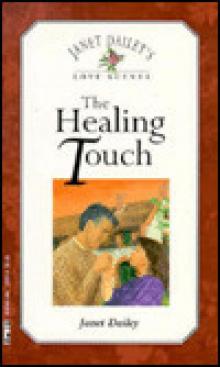 janet dailey- the healing touch
janet dailey- the healing touch Strange Bedfellow
Strange Bedfellow Leftover Love
Leftover Love Big Sky Country
Big Sky Country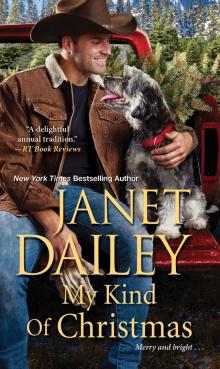 My Kind of Christmas
My Kind of Christmas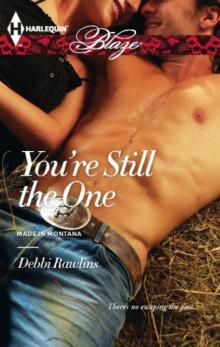 You're Still The One
You're Still The One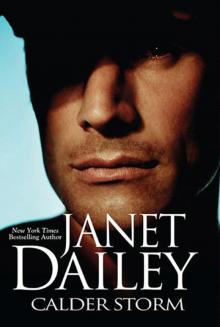 Calder Storm
Calder Storm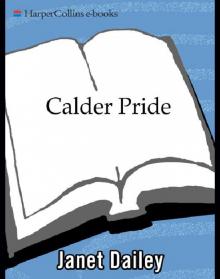 Calder Pride
Calder Pride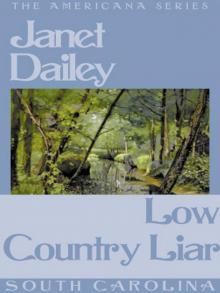 Low Country Liar
Low Country Liar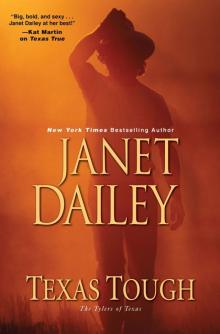 Texas Tough
Texas Tough Foxfire Light
Foxfire Light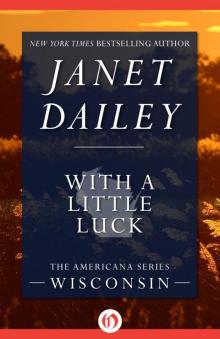 With a Little Luck (The Americana Series Book 49)
With a Little Luck (The Americana Series Book 49)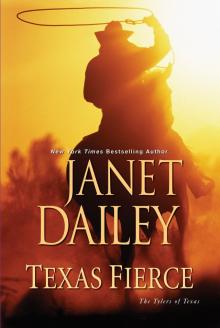 Texas Fierce
Texas Fierce Sentimental Journey
Sentimental Journey The Pride of Hannah Wade
The Pride of Hannah Wade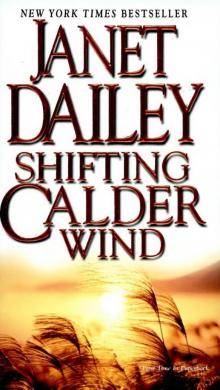 Shifting Calder Wind
Shifting Calder Wind Santa In Montana
Santa In Montana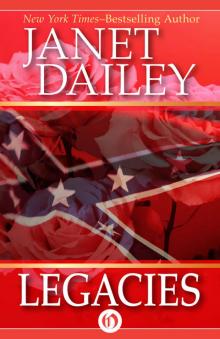 Legacies
Legacies Land of Enchantment
Land of Enchantment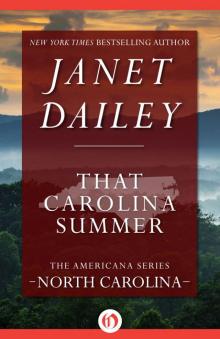 That Carolina Summer (North Carolina)
That Carolina Summer (North Carolina) Reilly's Woman
Reilly's Woman Refuge Cove
Refuge Cove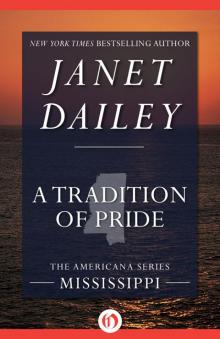 A Tradition of Pride
A Tradition of Pride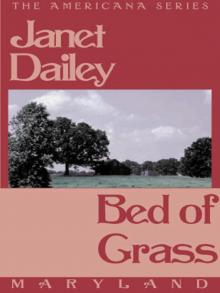 Bed of Grass
Bed of Grass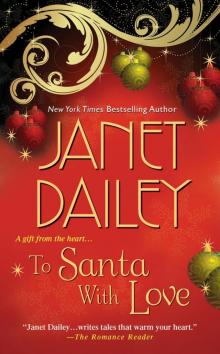 To Santa With Love
To Santa With Love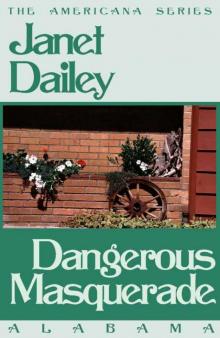 Dangerous Masquerade
Dangerous Masquerade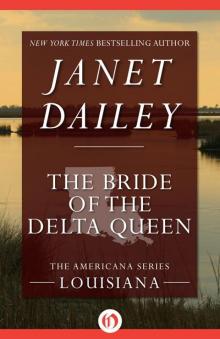 The Bride of the Delta Queen (The Americana Series Book 18)
The Bride of the Delta Queen (The Americana Series Book 18)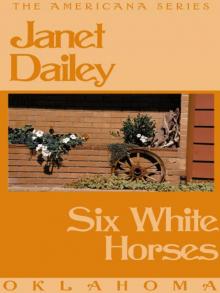 Six White Horses
Six White Horses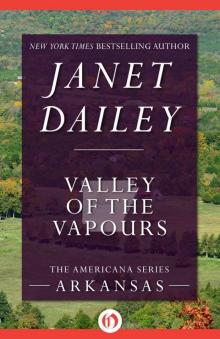 Valley of the Vapours (The Americana Series Book 4)
Valley of the Vapours (The Americana Series Book 4)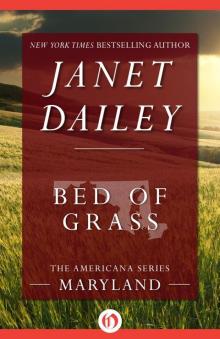 Bed of Grass (The Americana Series Book 20)
Bed of Grass (The Americana Series Book 20)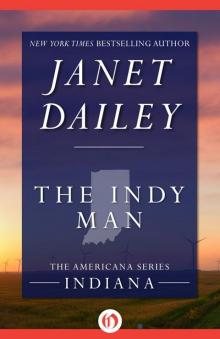 The Indy Man (The Americana Series Book 14)
The Indy Man (The Americana Series Book 14)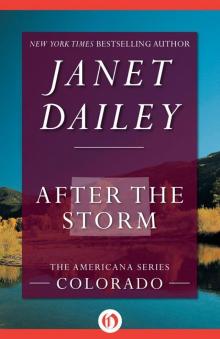 After the Storm (The Americana Series Book 6)
After the Storm (The Americana Series Book 6)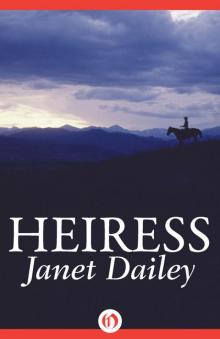 Heiress
Heiress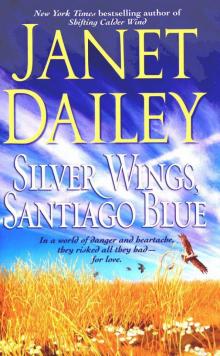 Silver Wings, Santiago Blue
Silver Wings, Santiago Blue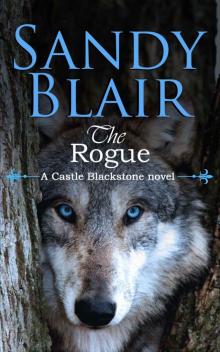 The Rogue
The Rogue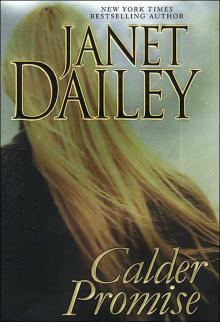 Calder Promise
Calder Promise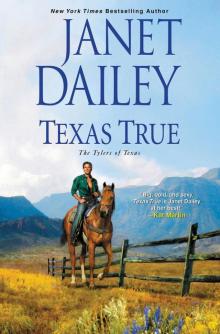 Texas True
Texas True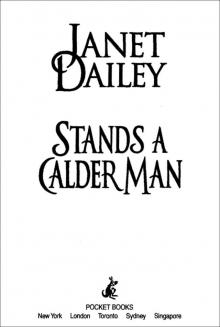 Stands a Calder Man
Stands a Calder Man Fiesta San Antonio
Fiesta San Antonio Fire and Ice
Fire and Ice For the Love of God
For the Love of God The Ivory Cane
The Ivory Cane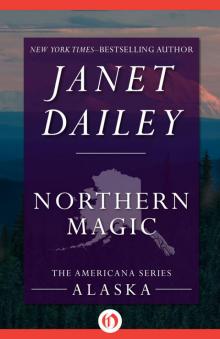 Northern Magic
Northern Magic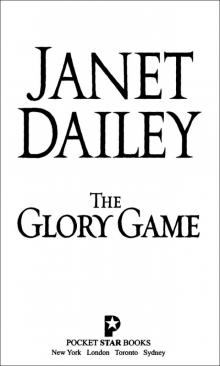 The Glory Game
The Glory Game The Homeplace
The Homeplace The Great Alone
The Great Alone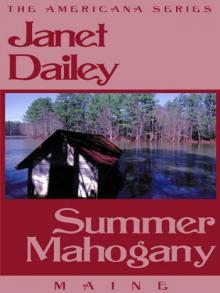 Summer Mahogany
Summer Mahogany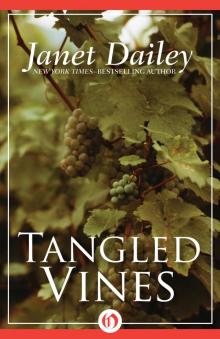 Tangled Vines
Tangled Vines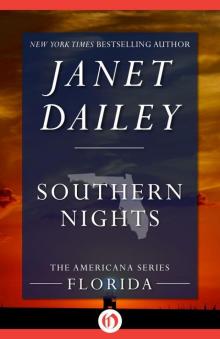 Southern Nights: Florida (The Americana Series Book 9)
Southern Nights: Florida (The Americana Series Book 9)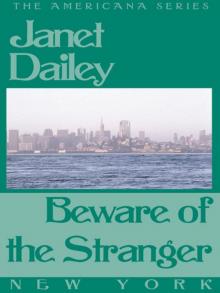 Beware of the Stranger
Beware of the Stranger Big Sky Country: Montana (The Americana Series Book 26)
Big Sky Country: Montana (The Americana Series Book 26)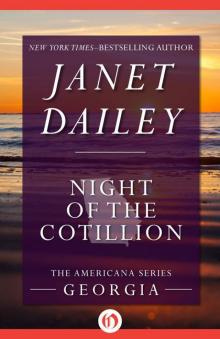 Night of the Cotillion: Georgia (The Americana Series Book 10)
Night of the Cotillion: Georgia (The Americana Series Book 10)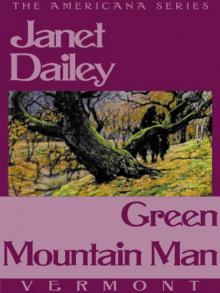 Green Mountain Man
Green Mountain Man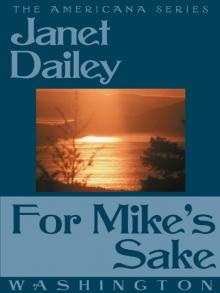 For Mike's Sake
For Mike's Sake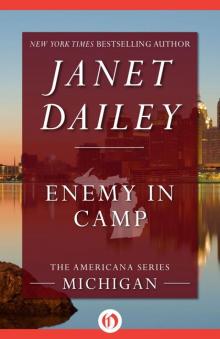 Enemy in Camp (The Americana Series Book 22)
Enemy in Camp (The Americana Series Book 22)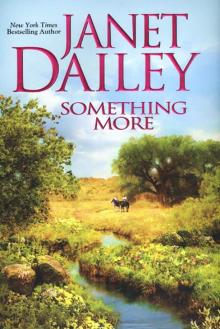 Something More
Something More Rivals
Rivals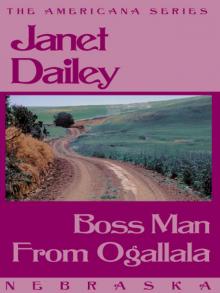 Boss Man from Ogallala
Boss Man from Ogallala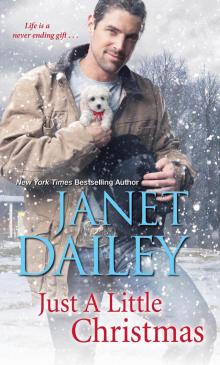 Just a Little Christmas
Just a Little Christmas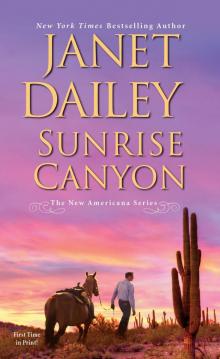 Sunrise Canyon
Sunrise Canyon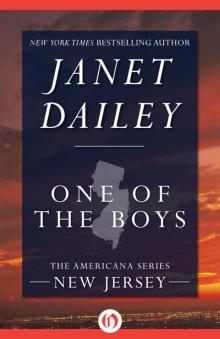 One of the Boys (New Jersey)
One of the Boys (New Jersey)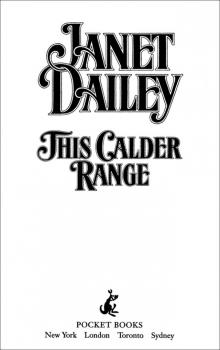 This Calder Range
This Calder Range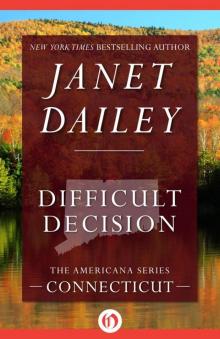 Difficult Decision: Connecticut (The Americana Series Book 7)
Difficult Decision: Connecticut (The Americana Series Book 7) Honor
Honor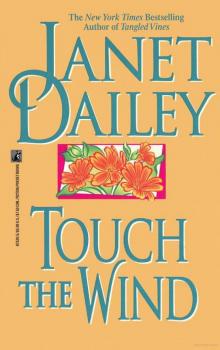 Touch the Wind
Touch the Wind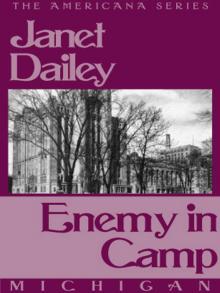 Enemy in Camp
Enemy in Camp Show Me
Show Me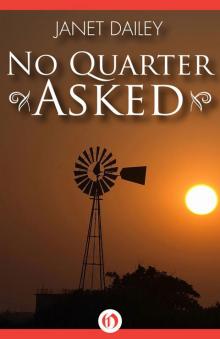 No Quarter Asked
No Quarter Asked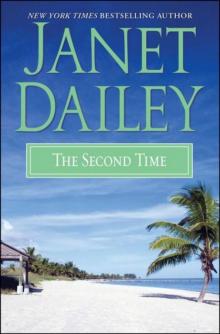 The Second Time
The Second Time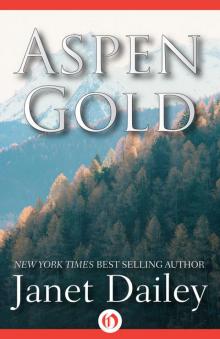 Aspen Gold
Aspen Gold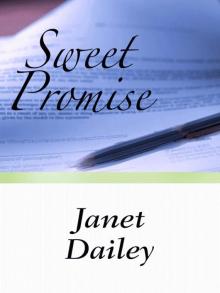 Sweet Promise
Sweet Promise Triumph
Triumph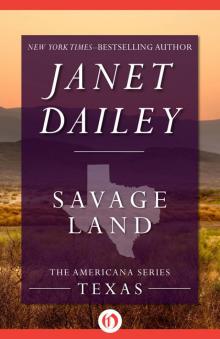 Savage Land
Savage Land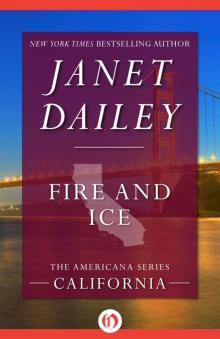 Fire and Ice (The Americana Series Book 5)
Fire and Ice (The Americana Series Book 5)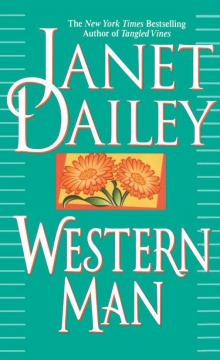 Western Man
Western Man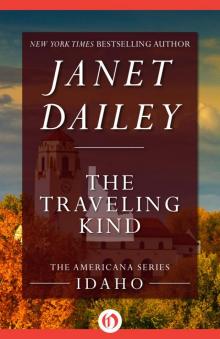 The Traveling Kind
The Traveling Kind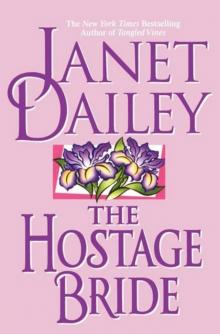 The Hostage Bride
The Hostage Bride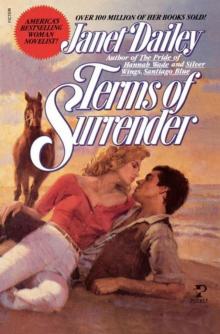 Terms of Surrender
Terms of Surrender Tidewater Lover
Tidewater Lover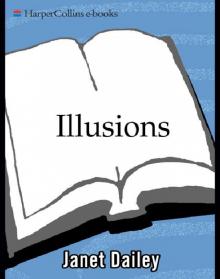 Illusions
Illusions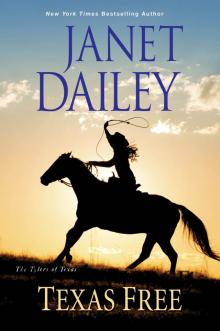 Texas Free
Texas Free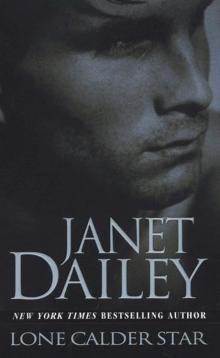 Lone Calder Star (Calder Saga Book 9)
Lone Calder Star (Calder Saga Book 9)